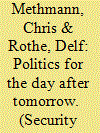|
|
|
Sort Order |
|
|
|
Items / Page
|
|
|
|
|
|
|
| Srl | Item |
| 1 |
ID:
137015


|
|
|
|
|
| Summary/Abstract |
The concept of resilience was born and grew up in the environmental sciences during the 1970s. After migrating into many other disciplines, resilience is now ‘coming home’ to the politics of the environment in the name of security. The field of climate change induced migration is investigated as a paradigmatic case of environmental security. On a theoretical level, resilience is studied as a governmentality; that is, as advanced liberal government which governs through contingency. On an empirical level, a brief genealogy of environmental migration is presented with a focus on the latest discursive shift towards resilience. It is demonstrated that climate change induced migration was once represented as a pathology to be prevented and, more recently, as an issue of refugee rights. However, the shift towards resilience has reframed the debate. Climate change-induced migration is now presented as a rational strategy of adaptation to unavoidable levels of climate change and the relocation of millions of people is rendered acceptable and rational. The most drastic policy implication of this shift is that the space of the political is eliminated. Climate change is presented as a matter of fact rather than as a social problem that could still be tackled by significant emission reductions and lifestyle changes by residents in the major developed economies.
|
|
|
|
|
|
|
|
|
|
|
|
|
|
|
|
| 2 |
ID:
114594


|
|
|
|
|
| Publication |
2012.
|
| Summary/Abstract |
The recent global climate change discourse is a prominent example of a securitization of environmental issues. While the problem is often framed in the language of existentialism, crisis or even apocalypse, climate discourses rarely result in exceptional or extraordinary measures, but rather put forth a governmental scheme of piecemeal and technocratic solutions often associated with risk management. This article argues that this seeming paradox is no accident but follows from a politics of apocalypse that combines two logics - those of security and risk - which in critical security studies are often treated as two different animals. Drawing on the hegemony theory of Ernesto Laclau and Chantal Mouffe, however, this article shows that the two are inherently connected. In the same way as the Christian pastorate could not do without apocalyptic imageries, today's micro-politics of risk depends on a series of macro-securitizations that enable and legitimize the governmental machinery. This claim is backed up by an inquiry into current global discourses of global climate change regarding mitigation, adaptation and security implications. Although these discourses are often framed through the use of apocalyptic images, they rarely result in exceptional or extraordinary measures, but rather advance a governmental scheme of risk management. Tracing the relationship between security and risk in these discourses, we use the case of climate change to highlight the relevance of our theoretical argument.
|
|
|
|
|
|
|
|
|
|
|
|
|
|
|
|
| 3 |
ID:
136100


|
|
|
|
|
| Summary/Abstract |
The literature on climate-induced migration agrees that it is almost impossible to identify individual people as displaced by global warming. At the same time, it is very hard not to see climate-refugees—thanks to the news, reports, films, and charity adverts that picture climate-refugees as the “human face of global warming.” This article engages with this often unnoticed and taken-for-granted field of visibility and investigates its implications for the securitization of climate-induced migration. Based on a Foucauldian notion of security, the paper conducts a visual discourse analysis of 135 images collected from publications, newspapers, and Web sites on climate-induced migration. Throughout this analysis, the climate migrant/refugee appears as a racialized figure, a passive and helpless victim of global warming. In turn, global warming is pictured as an overwhelming, omnipresent, and erratic threat, endangering large parts of the global population. This field of visibility showcases a shift from liberal biopolitics in the name of human security toward securing through fostering resilience. This shift depoliticizes the issue of global warming, makes those affected by it responsible for their own survival, reinstates them as the dangerous Other and so bars them from crossing the global “life-chance divide.”
|
|
|
|
|
|
|
|
|
|
|
|
|
|
|
|
|
|
|
|
|